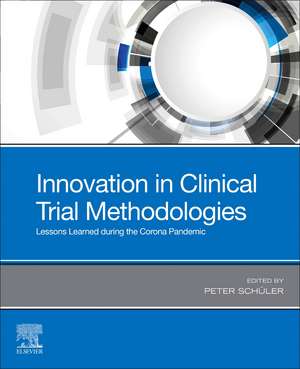Innovation in Clinical Trial Methodologies: Lessons Learned during the Corona Pandemic
Editat de Peter Schueleren Limba Engleză Paperback – 6 noi 2020
- Considers multiple digital and virtual strategies
- Explores best practices, including the use of reduced patient involvement
- Brings together expert, trusted information to increase the efficiency and effectiveness of clinical trials
Preț: 483.00 lei
Preț vechi: 508.42 lei
-5% Nou
Puncte Express: 725
Preț estimativ în valută:
92.43€ • 96.15$ • 76.31£
92.43€ • 96.15$ • 76.31£
Carte tipărită la comandă
Livrare economică 07-21 aprilie
Preluare comenzi: 021 569.72.76
Specificații
ISBN-13: 9780128244906
ISBN-10: 0128244909
Pagini: 202
Ilustrații: 40 illustrations (20 in full color)
Dimensiuni: 191 x 235 mm
Editura: ELSEVIER SCIENCE
ISBN-10: 0128244909
Pagini: 202
Ilustrații: 40 illustrations (20 in full color)
Dimensiuni: 191 x 235 mm
Editura: ELSEVIER SCIENCE
Public țintă
Market/Audience, Primary: Pharmacologists, physicians and clinical researchers involved in the process of clinical development and clinical trial designCuprins
Section 1 Introduction
1. Is the Covid pandemic an accelerator for digitalization?
2. Best practices for streamlined development
Section 2 Alternative study concepts requiring fewer patients
3. Use of historic data
4. Adaptive and platform trials
5. A vision: Studies without patients
Section 3 Studies with less patient interaction
6. Home Nursing replacing site visits
7. Telemedicine replacing site visits
Section 4 Design of "virtualized" protocols
8. Data mining for better protocols
9. Patient-centric registries for population enrichment
10. Make a protocol "patient centric"
11. The use of new digital endpoints
12. Regulations for apps in clinical trials
13. The role of the site and the patient
14. A real virtual trial
Section 5 From data to decisions
15. Data standards against data overload
16. Data analytics for operational excellence
17. Taking control of high data volume
18. Share the (digital) knowledge based on quality data
Section 6 Conclusions
1. Is the Covid pandemic an accelerator for digitalization?
2. Best practices for streamlined development
Section 2 Alternative study concepts requiring fewer patients
3. Use of historic data
4. Adaptive and platform trials
5. A vision: Studies without patients
Section 3 Studies with less patient interaction
6. Home Nursing replacing site visits
7. Telemedicine replacing site visits
Section 4 Design of "virtualized" protocols
8. Data mining for better protocols
9. Patient-centric registries for population enrichment
10. Make a protocol "patient centric"
11. The use of new digital endpoints
12. Regulations for apps in clinical trials
13. The role of the site and the patient
14. A real virtual trial
Section 5 From data to decisions
15. Data standards against data overload
16. Data analytics for operational excellence
17. Taking control of high data volume
18. Share the (digital) knowledge based on quality data
Section 6 Conclusions
Recenzii
"Much has been written on the correlation between crises and innovation. Our hope is that the COVID-19 crisis catalyzes enduring changes to clinical trial methodologies, ones that serve patients today and for years to come.
Peter Schüler has created a timely textbook for all involved in the critical processes of clinical trial conduct. He has brilliantly set the stage for a possible dramatic evolution of clinical trial strategy, methodology, conduct, and interpretation; this evolution will be essential to address patients’ needs not just now during the pandemic but will endure and be applied broadly to many other diseases and therapies." --Barbara Lopez Kunz, President and Global Chief Executive, DIA (Drug Information Association)
Peter Schüler has created a timely textbook for all involved in the critical processes of clinical trial conduct. He has brilliantly set the stage for a possible dramatic evolution of clinical trial strategy, methodology, conduct, and interpretation; this evolution will be essential to address patients’ needs not just now during the pandemic but will endure and be applied broadly to many other diseases and therapies." --Barbara Lopez Kunz, President and Global Chief Executive, DIA (Drug Information Association)
